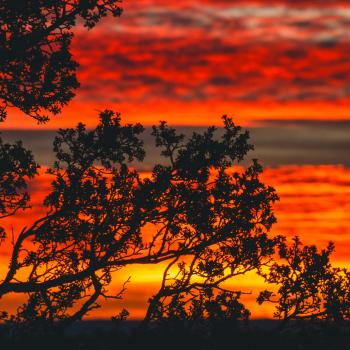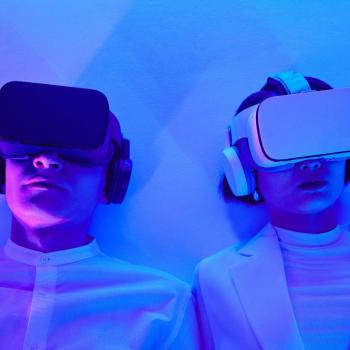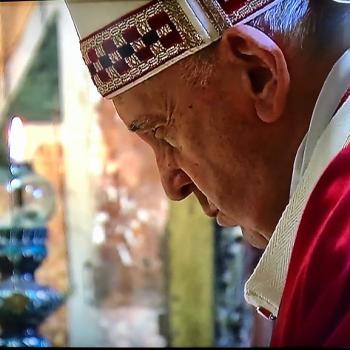So when we see this society destroyed, its loss is all the more real; further, when we see the grieving survivors of the colonies setting up a makeshift shrine in the hallways of Galactica using photos and other mementos of their loved ones, the audience's own memories of similar shrines on the streets of Manhattan is instantly evoked. Over the course of the series the characters return there repeatedly, reminding us both of their losses and ours.
It is this continual and courageous confrontation with the impacts of war, terrorism, and torture that has made BSG such essential viewing. While many conservatives latched on to the show early on for its depiction of a civilization under attack by a fanatical, monotheistic enemy, any attempt to identify "good guys" in the Galactica universe was quickly scotched. The show's main characters have at one time or another plotted to steal elections, tortured, killed civilians, committed acts of terrorism, and betrayed one another and their government. Indeed, most of the "humans" we have identified with were revealed to be artificial humanoid Cylon sleeper agents, yet fully retain our sympathies. BSG has constantly challenged the audience to question what it means to be human, to reflect on how easy it is to dehumanize others in a time of war, and to understand how war itself dehumanizes us.
This was particularly true at the end of the show's second season, in which the fleet had settled on a world they called "New Caprica," only to be discovered by the Cylons, who swiftly invaded, imposed total control over the humans, and co-opted the weak and selfish then-President Gaius Baltar (James Callis) to be their Vichy leader. In the third season, most of the main characters formed a secret resistance force while the Cylons, publicly stating their intention to create a unified, peaceful New Caprica, recruited humans to serve in the civilian police force, and used them to hunt down the resistance fighters and imprison them. Later it turns out that the characters leading the resistance were, in fact, all (unknowingly) Cylons themselves.
This continual upturning of expectations, destruction of moral certitudes, and identification with the "other" only intensified in the fourth season when the long-sought planet Earth - the mythical "13th Colony" - was finally discovered, only to be revealed to be a blackened ruin from a 2,000-year-old nuclear war. With the loss of this final myth - the one thing that had held Galactica and the fleet together through their desperate flight though space - human society began to unravel badly. Morale cratered, people turned on one another violently, and a mutiny and coup erupted. Even the very structure of Galactica itself started to give way, and the ship is largely evacuated for a rebel Cylon base ship.
In last week's finale, however, it was revealed that this irradiated "Earth" was not the one we live on, but rather a completely different world known to the Colonials by that name. Our planet shows up in the final hour - inhabited by spear-carrying hominids - and is dubbed "Earth" in memory of the lost, destroyed colony.
But by this time the humans and Cylons alike have apparently lost any faith in the project of civilization. Convinced that rebuilding their cities and returning to their former social structures will lead once again to self-destruction, both peoples scatter in small groups across Earth. Sadly, the show's main characters even decline to remain part of any community at all but go off alone or in pairs to live as hunter-gatherers or farmers.
Flash forward 150,000 years later and the series closes with images of our own gigantic cities and the latest advances in robotics. Despite the Colonists' chosen isolation many millennia ago, civilization has returned, with all its glories and injustices. True to the series' spirit, producer Ron Moore and his writers leave open to interpretation whether or not we will avert the fate of the 13 Colonies. What is less clear is whether they share their characters' cynical fatalism about civilization - that all attempts at forming human societies are necessarily doomed and should therefore be avoided.
For four seasons we have heard the Colonists' religious precept that "all this has happened before and will happen again." In this portrait of cyclical histories, despite appeals to the supernatural to explain events and leaving open the hope that something will emerge to prevent history from repeating itself, BSG (perhaps unwittingly) adopted a highly Toynbeean view of its universe. As such, it's worth reminding ourselves what the great Arnold J. Toynbee wrote on this theme in his classic A Study of History, which was written at the close of World War II but seems equally applicable now:
"A civilization is not like an animal organism, condemned by an inexorable destiny to die after traversing a pre-determined life course. [A]succession of catastrophic events on a steeply mounting gradient inevitably inspires a dark doubt about our future, and this doubt threatens to undermine our faith and hope at a critical 11th hour which calls for the utmost exertion of these saving spiritual faculties. Here is a challenge that we cannot evade, and our destiny depends on our response." (2)




